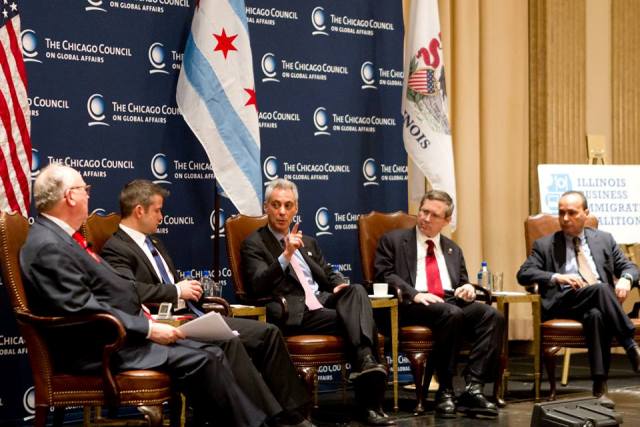Neil Steinberg's 'Esquire' Profile Of Emanuel Pulls Few Punches
By Chuck Sudo in News on Feb 20, 2014 10:35PM

Photo by Brooke Collins/City of Chicago
Rahm Emanuel faces increasing criticism at home yet his name recognition affords him a measure of protection on a national stage. Example: last month while visiting Seattle with my girlfriend (a native Seattleite), her mother and other relatives asked me what I thought about Emanuel’s mayoralty. My lengthy and unvarnished answer didn’t jibe with their perceptions of the mayor from news reports.
Neil Steinberg attempts to look at Emanuel’s contradictions in a strong profile in this month’s Esquire magazine that comes closer than previous profiles of our current Elective Majesty of taking Emanuel to task for his handling of Chicago’s myriad of problems during his time in office. Steinberg was able to interview Emanuel for the story and, to Steinberg’s credit, isn’t charmed by the Tiny Dancer the way other journalists have been. (And credit that to Steinberg seeing firsthand the consequences of many of Emanuel’s actions.)
“In a city known for political brawling, the mayor is a bastard’s bastard,” Steinberg writes, “profoundly profane and epically vindictive.” Steinberg notes correctly that Emanuel inherited some serious messes from his predecessor, Richard M. Daley, but that he never publicly blames Daley by name “as he tries to squeegee away the muck (Daley) left behind everywhere.”
Yet Steinberg is also quick to note the black community’s growing disenchantment with the mayor, a stark contrast to how 59 percent of African American voters cast ballots for Emanuel in 2011. Emanuel spends much of his days publicly visiting predominantly black wards to press flesh with residents, which one black alderman calls the “Black Tour.” Steinberg writes:
He could stay hidden in City Hall, working the levers of power, and let his money—he’s already raised, more than $5 million for the 2015 election—do his runny-nose wiping. But he doesn’t. Either because he loves people—his explanation—or because his disapproval numbers have never been higher, especially among black voters.
The size of Emanuel’s campaign war chest raises another question: who will challenge Emanuel for the Fifth Floor next year? Conventional wisdom hold that the sheer size of Emanuel’s campaign fund and his ruthless aggression as a campaigner would scare away many who do have eyes on his job. Steinberg posits, again correctly, Emanuel (like Daley) may not face a serious challenge and could be mayor for life. Given that Emanuel is a fitness nut that could be a mighty long time.
Other notable quotes from the article:
On Chicago’s new network of speeding cameras and Emanuel’s contention they’re more a public safety issue than a naked cash grab for a revenue-starved city: “Many politicians clutch at the concept of ‘the children,’ but Rahm grabs them like human shields.”
On Emanuel’s decision to reduce the number of cops in his security detail and those of Daley and Ald. Ed Burke: "The people of Chicago could sleep easier knowing those five or six cops were now freed up to fight crime."
On Emanuel’s “my way or the highway” approach to government: “His type of leadership is destroying the relationships traditionally forged with City Hall,” says Alderman Bob Fioretti, the mayor’s most vocal critic on the city council. “He is divisive toward many of the groups that have traditionally formed the Democratic base: police, firefighters, and all the African-American community.”
Steinberg is spot-on in calling out Emanuel on trying to placate black voters more than a year away from the 2015 election. He also manages to give some propers to Chicago Teachers Union president Karen Lewis—the only person who has managed to make Emanuel blink during his time in office. And yet for all the jabs which Steinberg manages to connect even he fails to give the reader a sense of the desperation, the despondency and the disgust Emanuel's policies have wreaked on the city's residents, or the way Emanuel's press office deflects criticism with facile news on the latest company to relocate 100 jobs downtown in the mayor's attempts to make Chicago a "world class city."
This is the article on Emanuel to show out-of-towners who believe the hype and locals who feel the city is on an upward trajectory just because there are a few miles of protected bike lanes to use.